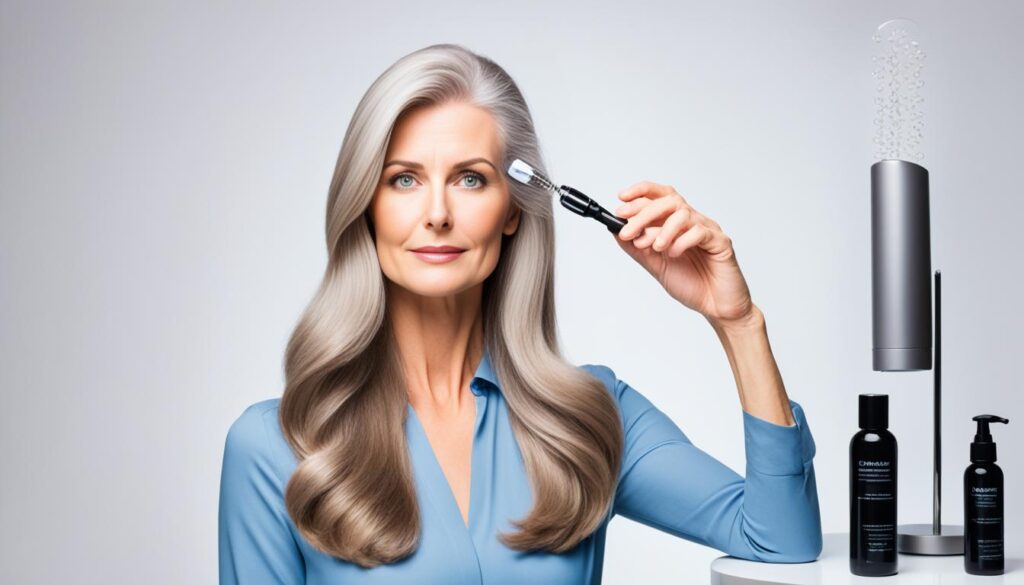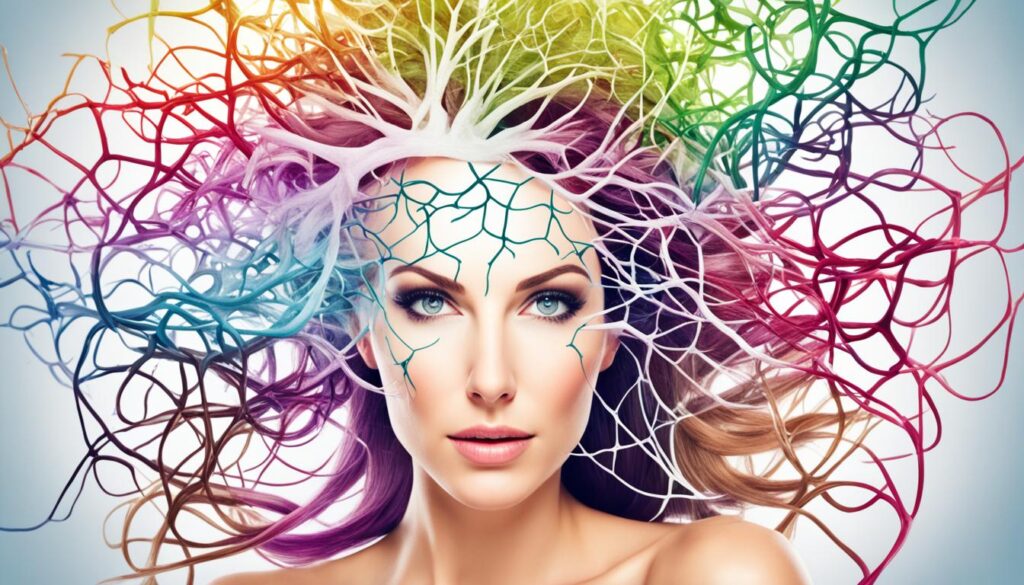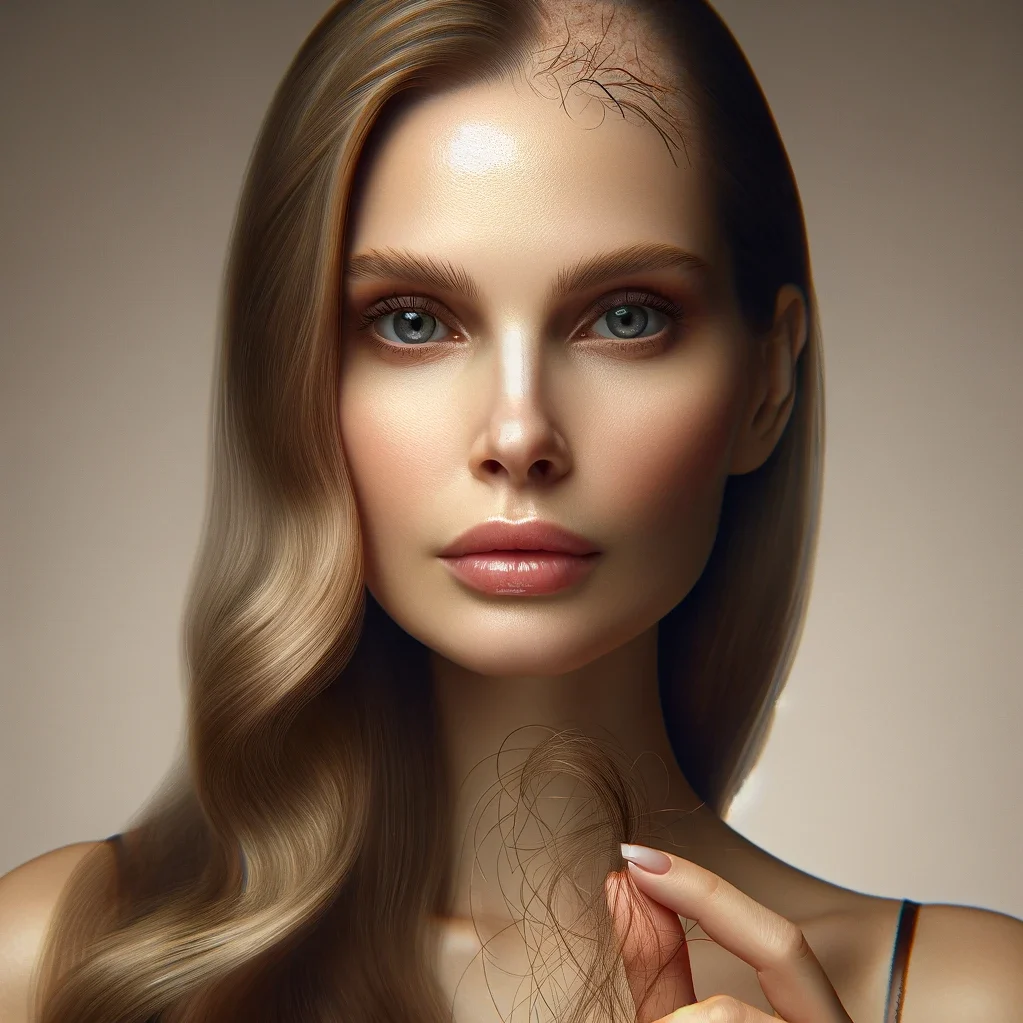Did you know that hormonal imbalances can contribute to hair loss? It’s true! In fact, an estimated 50 million men and 30 million women experience hair loss due to hormonal imbalances at any given time. This means that hormonal changes can have a significant impact on the health and thickness of your hair.
Hormones play a crucial role in various aspects of our health, including metabolism, fertility, mood, and sleep. When there is an imbalance in hormones, such as those caused by disorders like polycystic ovary syndrome (PCOS) and thyroid issues, it can lead to hair loss. Specifically, imbalances in hormones like testosterone, dihydrotestosterone (DHT), thyroid hormones, and cortisol can contribute to a condition known as androgenic alopecia, or pattern baldness.
If you’re experiencing hair fall due to hormonal imbalance, it’s important to consult with a dermatologist or endocrinologist to determine the exact cause of your hair loss and develop a tailored treatment plan. Understanding the underlying hormonal changes is key to addressing the issue effectively.
Key Takeaways:
- Hormonal imbalances can lead to hair loss, affecting millions of men and women.
- Imbalances in hormones such as testosterone, DHT, thyroid hormones, and cortisol contribute to androgenic alopecia.
- Consulting with healthcare professionals is essential for accurate diagnosis and personalized treatment options.
- Treatment approaches may include hormone therapy, medications, lifestyle adjustments, and innovative therapies like platelet-rich plasma (PRP) therapy.
- By addressing hormonal imbalances, individuals can improve their hair health and regain their confidence.
Understanding Hormonal Imbalances and Hair Loss
Hormones are responsible for regulating numerous bodily functions, and they can also have a significant impact on hair health. One common type of hair loss associated with hormonal imbalances is androgenic alopecia, also known as pattern baldness. While this condition is often attributed to aging and genetics, hormonal imbalances can actually cause hair loss to occur at a younger age.
Hair loss due to hormonal imbalances typically occurs gradually, with symptoms such as a receding hairline, thinning ponytail, or visible scalp becoming noticeable over time. Imbalances in hormones such as testosterone, dihydrotestosterone (DHT), thyroid hormones, and cortisol can contribute to hair loss.
Diagnosing the exact cause of hair loss is crucial in order to determine the most effective treatment approach. By identifying and addressing the underlying hormonal imbalances, individuals can take steps towards restoring hair growth and improving their overall hair health.
“Hair loss due to hormonal imbalances typically occurs gradually, with symptoms such as a receding hairline, thinning ponytail, or visible scalp becoming noticeable over time.”
To further understand the impact of hormonal imbalances on hair loss, let’s take a closer look at the hormones involved:
| Hormone | Function | Impact on Hair Health |
|---|---|---|
| Testosterone | Plays a role in the development of male reproductive tissues and secondary sexual characteristics | High levels of testosterone can lead to dihydrotestosterone (DHT) production, which contributes to hair follicle miniaturization |
| Dihydrotestosterone (DHT) | A byproduct of testosterone conversion | High levels of DHT can shrink hair follicles, leading to thinner and shorter hair growth cycles |
| Thyroid Hormones | Regulate metabolism, growth, and development | Imbalances in thyroid hormones can disrupt the hair growth cycle and result in hair thinning or loss |
| Cortisol | Produced in response to stress | Chronically high levels of cortisol can contribute to hair thinning and loss |
Understanding the role of these hormones in hair health can help individuals and healthcare professionals develop targeted treatment plans to address hormonal imbalances and effectively combat hair loss.
How Hormonal Imbalances Cause Hair Loss
Hormonal imbalances can disrupt the natural hair growth cycle. These imbalances can cause hair follicles to enter a resting phase prematurely, leading to reduced hair growth and eventual hair loss. In the case of androgenic alopecia, hormone imbalances can result in the prolonged resting phase of hair follicles, causing them to shrink and produce thinner, weaker hair strands.
In addition, imbalances in hormones like testosterone and DHT can have a direct impact on the size and shape of hair follicles. High levels of DHT can bind to hair follicles, leading to inflammation and miniaturization. Over time, this can result in the production of finer, shorter, and weaker hair strands, eventually leading to hair thinning and loss.
Addressing hormonal imbalances is essential in order to halt the progression of hair loss and promote healthy hair regrowth. Through the use of targeted treatments and lifestyle adjustments, individuals can rebalance their hormonal levels and improve their overall hair health.
Treating Hormonal Hair Loss
Treating hair loss caused by hormonal imbalances often requires a multidimensional approach. Seeking guidance from an endocrinologist or dermatologist is essential to rebalance hormonal levels and address the underlying cause of hair loss.
Hormone therapy may be recommended, particularly for women experiencing postpartum or menopause-related hair loss. Hormone replacement therapy (HRT) can help restore hormonal balance and promote hair regrowth. For individuals dealing with pattern baldness, medications such as minoxidil – commonly known as Rogaine® – may be prescribed.
Additionally, in-house treatments like microneedling and platelet-rich plasma (PRP) therapy can help prevent further hair loss and stimulate hair regrowth.
This holistic approach to treating hormonal hair loss combines medical interventions with lifestyle adjustments for optimal results. Stress management techniques, maintaining a balanced diet, and regular exercise can contribute to hormonal balance and support healthy hair growth.

Implementing these comprehensive strategies under the supervision of qualified healthcare professionals can significantly improve the condition of those experiencing hormonal hair loss.
The Role of Hormones in Hair Health
Hormones play a crucial role in maintaining healthy hair and supporting the proper functioning of hair follicles. Understanding how hormones impact hair health is essential for addressing hair loss and promoting regrowth.
Androgens: Androgens, a group of hormones that include testosterone and dihydrotestosterone (DHT), directly affect hair follicles. These hormones can influence the size, shape, and lifespan of hair follicles. Imbalances in androgen levels can lead to hair thinning and loss.
Thyroid Hormones: The thyroid gland, located in the neck, produces hormones that play a crucial role in regulating various bodily functions, including metabolism and heart rate. Disruptions in thyroid hormone levels, such as in cases of hyperthyroidism or hypothyroidism, can disrupt the natural hair growth cycle.
Progesterone and Estrogen: Fluctuations in hormone levels, particularly progesterone and estrogen, can occur during different stages of life such as pregnancy, postpartum, and menopause. These hormonal changes can contribute to hair thinning. Maintaining hormonal balance is important for preserving healthy hair.

Effective Solutions for Hormonal Hair Loss
Addressing hormonal hair loss requires a combination of treatment methods. Hormone therapy, such as Hormone Replacement Therapy (HRT), can help restore hormonal balance and promote hair regrowth, particularly in women experiencing postpartum or menopause-related hair loss.
Medications that block the production of dihydrotestosterone (DHT) may also be prescribed to reduce its impact on hair follicles. Lifestyle adjustments, including regular exercise, effective stress management, and a balanced diet, can support healthy hormonal levels and hair growth.
One innovative treatment option for hormonal hair loss is platelet-rich plasma (PRP) therapy. This therapy utilizes the healing power of the body to stimulate hair regrowth. By injecting PRP into targeted areas of the scalp, the platelets help prolong the hair growth phase and encourage new hair growth.
| Treatment | Benefits |
|---|---|
| Hormone Therapy (HRT) | Restores hormonal balance and promotes hair regrowth |
| Medications that block DHT production | Reduces the impact of DHT on hair follicles |
| Lifestyle Adjustments | Supports healthy hormonal levels and hair growth |
| Platelet-Rich Plasma (PRP) Therapy | Stimulates hair regrowth by injecting PRP into the scalp |
These treatment options can be tailored to an individual’s needs and combined for optimal results. Consulting with a dermatologist or endocrinologist is essential to determine the most suitable treatment plan for hormonal hair loss.
By addressing hormonal imbalances through appropriate treatments, individuals can effectively combat hair loss and restore healthy hair growth.
Conclusion
Hormonal imbalances can have a significant impact on hair health, leading to noticeable hair loss in both men and women. Identifying the underlying cause of hair loss is crucial for developing an effective treatment plan. Consulting with healthcare professionals who specialize in dermatology and endocrinology is essential for accurate diagnosis and personalized treatment options.
Hormone therapy, medications, lifestyle adjustments, and innovative treatments like platelet-rich plasma (PRP) therapy can help restore hormonal balance and promote hair regrowth. Hormone therapy, such as hormone replacement therapy (HRT), can effectively rebalance hormones and stimulate hair growth, particularly in women experiencing postpartum or menopause-related hair loss. Medications, such as minoxidil (Rogaine®), that block the production of dihydrotestosterone (DHT) can also be prescribed to reduce its impact on hair follicles.
Lifestyle adjustments, including regular exercise, effective stress management, and a balanced diet, play a crucial role in maintaining healthy hormonal levels and promoting hair health. Additionally, innovative treatments like platelet-rich plasma (PRP) therapy can stimulate hair regrowth by injecting platelet-rich plasma into targeted areas of the scalp, prolonging the hair growth phase and encouraging new hair growth.
By addressing hormonal imbalances through a combination of treatments and lifestyle modifications, individuals can improve their hair health and regain their confidence. Consulting with healthcare professionals is key to understanding the specific causes of hair loss and developing a comprehensive plan for addressing hormonal imbalances, ultimately leading to healthier, fuller hair.
FAQ
Can hormonal imbalances cause hair loss?
Yes, hormonal imbalances can lead to hair loss. Hormonal changes, such as those caused by disorders like polycystic ovary syndrome (PCOS) and thyroid issues, can result in hair loss. Hormonal imbalances disrupt the natural hair growth cycle and can contribute to conditions like androgenic alopecia.
What is androgenic alopecia?
Androgenic alopecia, also known as pattern baldness, is the most common type of hair loss associated with hormonal imbalances. It is characterized by gradual hair thinning and a receding hairline in both men and women. Imbalances in hormones like testosterone, dihydrotestosterone (DHT), thyroid hormones, and cortisol can contribute to androgenic alopecia.
How can hormonal hair loss be treated?
Treating hair loss caused by hormonal imbalances often requires a multidimensional approach. It is important to consult with an endocrinologist or dermatologist to determine the underlying cause and develop a tailored treatment plan. Hormone therapy, such as hormone replacement therapy (HRT), may be recommended. Medications like minoxidil (Rogaine®) and in-house treatments like microneedling and platelet-rich plasma (PRP) therapy can also be effective in addressing hormonal hair loss.
What is the role of hormones in hair health?
Hormones play a crucial role in regulating various bodily functions, including hair health. Androgens, such as testosterone and DHT, directly impact hair follicles and can affect their size, shape, and lifespan. Fluctuations in hormones like progesterone and estrogen, which occur during pregnancy, postpartum, and menopause, can also lead to hair thinning. Maintaining hormonal balance is essential for healthy hair growth.
What are effective solutions for hormonal hair loss?
Effective solutions for hormonal hair loss can vary depending on the individual. Seeking guidance from healthcare professionals like endocrinologists and dermatologists is essential. Treatment options may include hormone therapy, medications, lifestyle adjustments such as stress management and a balanced diet, and innovative treatments like platelet-rich plasma (PRP) therapy. These approaches can help restore hormonal balance and promote hair regrowth.
How can I improve my hair health if I have hormonal imbalances?
Improving hair health with hormonal imbalances often requires a comprehensive approach. Consulting with healthcare professionals is essential for accurate diagnosis and guidance. Treatment options may include hormone therapy, medications, lifestyle adjustments, and innovative treatments like platelet-rich plasma (PRP) therapy. By addressing hormonal imbalances, individuals can improve their hair health and regain their confidence.

